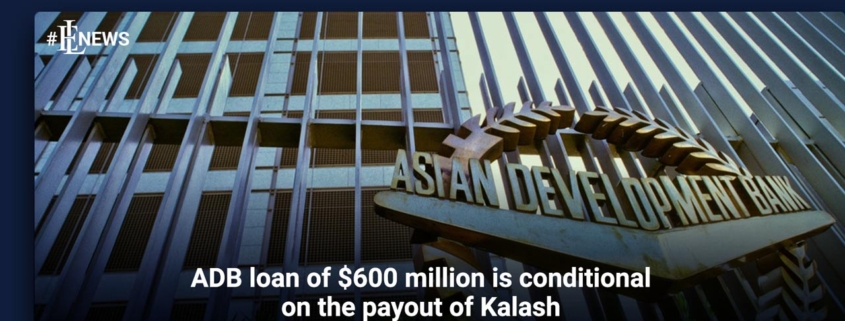ADB loan of $600 million is conditional on the payout of Kalash
ADB loan of $600 million is conditional on the payout of Kalash. In December, the Asian Development Bank (ADB) will approve a $600 million loan to fund the Benazir Income Support Program (BISP), now known as the Ehsas program.
Additionally, the loan proceeds will provide cash assistance to the Kalash people, who were previously almost wholly excluded from the BISP.
Yong Ye, the ADB’s country director, met with Omar Ayub Khan, the Federal Minister for Economic Affairs, and informed him about the $600 million programs that the ADB’s board of directors is expected to approve in December.
One of the program’s conditions is that the Kalash people be included in the BISP. According to the ADB report, only 3-4 percent of Kalash people currently receive BISP benefits. The majority of the Kalash were excluded from the initial BISP survey due to language barriers and high scores resulting from differing cultural perceptions of assets, it added.
As part of the program’s conditions, the government was required to ensure that IPs receive culturally compatible social and economic benefits and that appropriate mitigation measures are taken for any unavoidable adverse impact.
Kalash has a population of approximately 3,800 residents as of the 2017 census. This minuscule community is located in three valleys along the Pakistan-Afghanistan border in the Chitral district of Khyber Pakhtunkhwa: Birir, Rambur, and Bamburet.
According to a statement from the economic affairs ministry, the $600 million programs will assist the government in implementing high-priority elements of its Ehsaas Program – social protection and poverty reduction – in a coordinated, cohesive, and systematic manner.
Read BISP’s board of directors approves a new system for evaluating employee performance.
Additionally, this program will strengthen institutional capacity for social protection and climate resilience. Further, women, particularly mothers, adolescents, and children from low-income families, will have improved access to primary and secondary education, health services, and nutrition supplies.
The impact of the results-based lending (RBL) program will be consistent with the BISP’s goal of “fighting poverty and elevating the status of excluded and disadvantaged families, particularly women, through an integrated, responsive, and effective social protection program.”
Read more with EL news : KP authorized 14.5 billion PKR for 115 ADP projects
The result will be a “strengthened and expanded social protection system that alleviates poverty for poor women and their families.”
They will support the expansion of the CCT for education in its current form for primary and secondary education. The emphasis will be on increasing children’s enrollment in formal education, including out-of-school children.
Additionally, the BISP will pilot a program for older out-of-school children who attend non-formal education or accelerated learning programs in provincially run schools.
Additionally, the ADB approved $394 million for the BISP in 2013 and another $200 million in 2019. Both of these facilities are about to expire and will be phased out in favor of new lending. The ADB contributed $200 million to the BISP during the Covid pandemic.
Yong Ye, the country director, briefed the minister on the ADB’s portfolio in Pakistan during the meeting. Yong emphasized the ADB’s commitment to Pakistan of $6.3 billion under the Country Operation Business Plan (2021-23). Thirty-two projects totaling $6.4 billion are currently being implemented in the energy, road and transportation, agriculture and irrigation, urban services, education, health, and social protection sectors.
Keep up with Estate Land Marketing for news and updates




Leave a Reply
Want to join the discussion?Feel free to contribute!